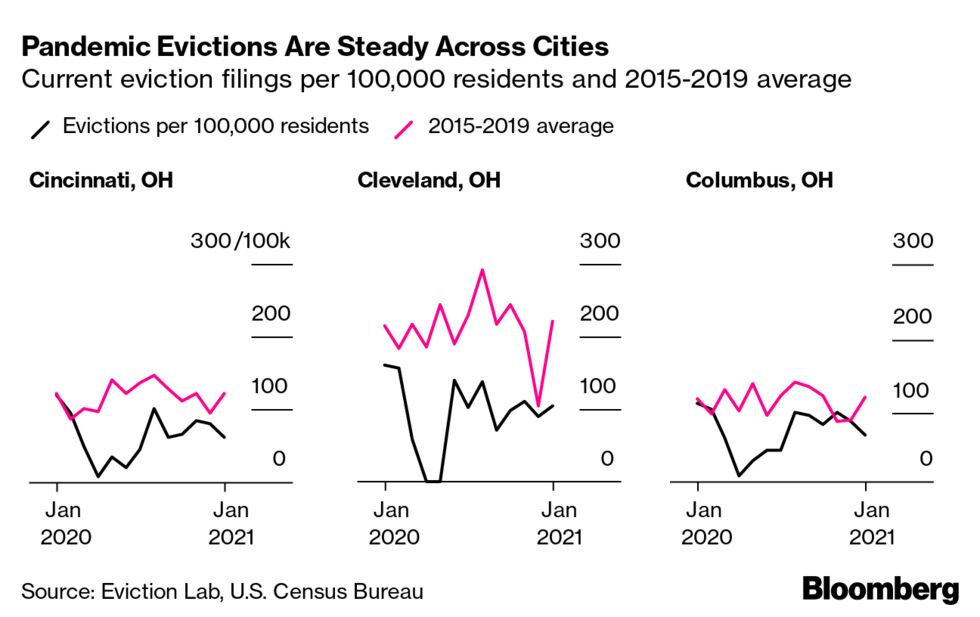An Ohio judge has blocked the federal eviction ban, allowing landlords to resume filings against tenants in the Cleveland area — and perhaps nationwide.
By Kriston Capps March 12, 2021


Kriston Capps is a writer for CityLab in Washington, D.C., focused on housing, architecture and the built environment.@kristoncapps
8112638ZPACIFIC LEGAL FOUNDATIONPrivate Company
In a March 10 decision, a federal court in Cleveland blocked the national eviction moratorium, making it the second court to challenge the emergency measure implemented under President Donald Trump and extended by the Biden administration. The order clears the way for courts and landlords to resume evictions against tenants across much of Ohio. But the landlord groups who brought the suit believe that the decision could have a broader national application, setting the stage for an earlier-than-anticipated resumption of eviction activity before the ban expires on March 31.
The judge ruled that the Centers for Disease Control and Prevention, which introduced its ban on evictions in September, lacks the authority to enact such a policy. While the court stopped short of issuing an injunction against the CDC ban, its decision goes further than the Texas court that made a similar call late in February.
The CDC and other public health experts have argued that a moratorium on evictions is necessary to prevent the spread of Covid-19. U.S. District Judge Philip Calabrese, who was nominated by Trump and sworn in on Dec. 5, said that it was the court’s duty to weigh a more limited statutory question alone. “That narrower issue depends on interpretation of the particular statutes at issue — a more lawyerly and arcane task about which reasonable people may ultimately disagree,” Calabrese wrote in his decision.
How far the Ohio court’s decision reaches in enabling landlords to once again legally throw out their tenants for nonpayment may be an even thornier question for the courts.
According to Steve Simpson, senior attorney for the Pacific Legal Foundation and the plaintiff’s attorney in this case, at its absolute narrowest the decision would only lift the eviction ban in the Northern District of Ohio, which includes Akron, Cleveland, Toledo and Youngstown. But he believes that the decision should also allow landlords located in other states and associated with the plaintiffs — among them Monarch Investment and Management Group, which manages more than 64,000 properties across 21 states — to consummate their eviction filings.
“This is a debate in legal circles, what’s the scope of a judge declaring a statute or rule contrary to law, whether it applies to the parties before the case, the district or the whole country,” Simpson says. “Our interpretation is that it should apply to the whole country.”
In his decision, Calabrese invalidated (or set aside) the CDC eviction moratorium under a provision of the federal Administrative Procedure Act known as section 706. The full scope of remedies under section 706 is a point of contention that has surfaced in recent years in high-profile decisions such as Trump v. Hawaii, the Muslim travel ban case.
The U.S. Department of Justice has already announced that it will appeal the Texas decision that invalidated the eviction moratorium. The DOJ statement argues that the February decision in Terkel v. CDC applies only to the plaintiffs at hand. A spokesperson for the CDC said that the agency is aware of the Ohio decision and working with the DOJ to review it and determine its next steps.

Courts across the country are still processing evictions due to loopholes in the CDC order; only in a few states, and for limited periods of time, have court filings fallen to zero. Eviction filings in Ohio have mostly fallen from historical levels, but they are on the rise. Unless the Biden administration intervenes, courts could begin legally processing evictions in Ohio — and possibly elsewhere — immediately. Ohio renters face some of the highest risk of eviction in the U.S.
The potentially sweeping decision on evictions comes just as President Joe Biden signed the American Rescue Plan, which will deliver billions of dollars of relief to landlords in the form of emergency rental aid. But it will take some time to get those dollars flowing, which led tenant advocates to sound the alarm over evictions on Thursday.
“Now that Congress has appropriated $46 billion to address rent arrears, these lawsuits to overturn the moratorium are frivolous,” said Diane Yentel, president and CEO of the National Low Income Housing Coalition, in an email. “These landlords will be made whole, but it will take time to get the money into their hands. Their eagerness to overturn the moratorium, despite unprecedented resources to pay rent arrears, only underscores the need to be sure the moratorium is extended at least until resources are expended. For some of these landlords, it appears it was never really about the money.”
Landlords, industry groups and civil liberties associations have worked to overturn state and federal eviction orders since Congress issued the original federal eviction moratorium as part of the CARES Act. The Pacific Legal Foundation is appealing a separate decision in a Louisiana case that affirmed the eviction moratorium.
